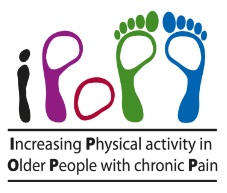iPOPP
Increasing Physical activity in Older People with chronic Pain

Summary
Physical inactivity rates are high in older people (>65 years), a group that will soon constitute 24% of the UK population. Interventions to increase levels of physical activity are therefore required. Walking, a form of moderate physical activity, is particularly acceptable to older people with pain, although interventions to increase walking in this population remain untested. This study aims to design and test a brief and simple intervention to promote walking (iPOPP).
The team has completed phase 1 of the iPOPP study where they worked closely with patients in this age group who suffer with chronic pain and healthcare professionals to refine and agree the components of a simple, brief walking intervention specifically for this population. From this work they have been able to develop a comprehensive training package for local Health Care Assistants who will deliver this intervention in primary care.
The second phase of the study is a pilot randomised controlled trial to which will examine whether the iPOPP walking intervention can be delivered in GP practices by Health Care Assistants and is feasible and acceptable to older adults with chronic pain.
| Chief Investigator: | Dr Claire Jinks Dr John McBeth |
| Associate Investigator: | Dr Emma Healey |
| Trial Manager: | Dr Liz Hartsthorne |
| Sponsor / Reference Number: | Keele University / TBC |
| Funder / Reference Number: | Arthritis Research UK (ARUK) 20608 |
| UKCRN Study Portfolio Reference Number: | 20117 |
| Registration Reference Number: | TBC |
| Start Date: | 2015 |
| End Date: |
Study design
A pilot multi-centre 3-arm individually randomised RCT recruiting participants from 4 general practices.
Aim and objectives
Aims to investigate the feasibility and acceptability of a Health care Assistant led iPOPP intervention to promote walking in older adults with chronic pain, and assess trial design and processes.
1) To refine and agree the content of the iPOPP intervention
2) To develop an iPOPP training programme for health care assistants (HCAs).
3) To undertake a pilot randomised controlled trial to investigate the feasibility and acceptability of the intervention to promote walking, and test trial design and processes.

